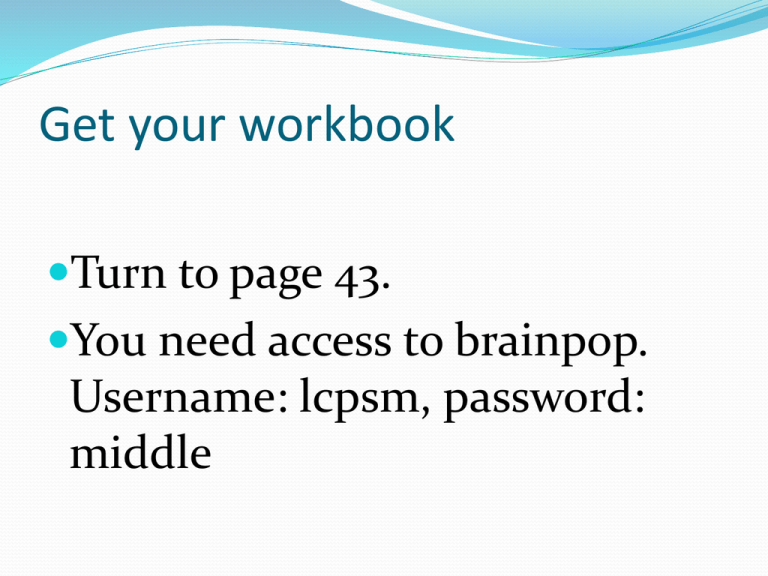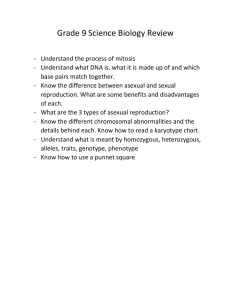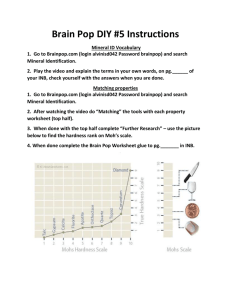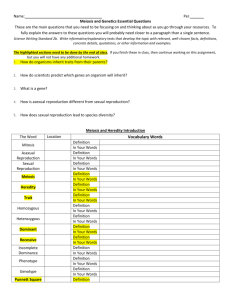Get your workbook Turn to page 43. You need access to brainpop.
advertisement

Get your workbook Turn to page 43. You need access to brainpop. Username: lcpsm, password: middle Discussion Slides The following slides are for information only No writing is required What characteristics could scientists use to sort (classify) living organisms? 1) The number of cells Unicellular (one) / Multicellular (more than one) 2) If it has a nucleus X X Eukaryotic / Prokaryotic (true) (no) 3) The method of obtaining food 4) The ability to move Old 5 Kingdom System Monera Protists Plants Fungi Animals Old 5 Kingdom System Monera Protists Plants Fungi Animals Eubacteria (normal bacteria) Archaebacteria (old, weird bacteria) Old 5 Kingdom System Monera Protists Plants Fungi Animals NEW 3 Domain system Bacteria (Kingdom Eubacteria) Archaea (Kingdom Archaebacteria) Eukaryotes (4 Kingdoms: Protists, Plants, Fungi, Animals) http://www.brainpop.com/science/diversityoflife/sixkingdoms/ Top of Pg. 39 3 Domain system Bacteria no nucleus, normal environments Archaea no nucleus, extreme environments Eukaryotes has a nucleus http://www.brainpop.com/science/diversityoflife/sixkingdoms/ Time to take notes!!!! Pg. 43 Remember: Eukaryotic = nucleus Prokaryotic = no nucleus Cell Type Eukaryotic Cell Wall? No # of Cells Multi-cellular Obtain food Consume it! Movement Most are mobile Reproduction Sexual or Asexual (depends on organism) Fun Fact •Found within most habitats •Require oxygen •Maintain homeostasis Fun Fact! Carvings in tree stems will not move! Cell Type Eukaryotic Cell Wall? Yes # of Cells Multicellular Obtain food Photosynthesis Require: Oxygen, Carbon Dioxide, Water, Minerals (from soil) Movement Non-mobile Plants will grow toward light, leaves move Reproduction Sexual /Asexual Fun Fact Plants are found virtually everywhere Except: Arid deserts, arctic, deep ocean Cell Type Eukaryotic Cell Wall? Yes # of Cells Mostly Multicellular Obtain food Decomposers Organic Compounds (plants and animals) Movement Non-mobile BUT cells can move as a team ~Through hyphae “Grow to get food” Reproduction Sexual or Asexual (spores) Fun Fact Fun Facts! The largest fungus is 2,200 acres big! It takes 50-100 years for fungi to decompose a tree Watch the brainpop. Username: lcpsm, password: middle http://www.brainpop.com/s cience/diversityoflife/fungi/ Cell Type Eukaryotic Cell Wall? Some have, some don’t # of Cells Unicellular or Multicellular (but they don’t have specialized tissue!) Obtain food Photosynthesis/Engulfing Organic Compounds (plants and animals) Movement Flagella Cillia Pseudopods – False foot Non-Mobile Reproduction Sexual or Asexual (spores) Fun Fact Must live in liquid (water) There are 60,000 types! http://www.brainpop.com/science/diversityoflife/protists/ Watch the brainpop. Username: lcpsm, password: middle http://www.brainpop.com/s cience/diversityoflife/protis ts/ There are a couple of other brainpops about the different types of protists. You are welcome to search around for them, but they aren’t required. Cell Type Prokaryotic Cell Wall? Yes # of Cells Unicellular Obtain food Use organic compounds (normal stuff) Movement Flagella Tumbling Re-arranging cytoskeleton Reproduction Asexual (Binary Fission) Fun Fact They live in every normal habitat on earth – even in YOU!! There are 10x more bacteria cells in your body right now than human cells! Cell Type Prokaryotic Cell Wall? Yes # of Cells Unicellular Obtain food WIDE RANGE!!! (weird stuff!) Inorganic compounds, Ammonia, Metal Ions, Hydrogen, Gas Movement Flagella Reproduction Asexual (Binary Fission) Fun Fact They live in EXTREME habitats! Halophiles (high salt), Acidophiles, Thermophiles, Alkaliphiles, even on Mars?? Cell Type Prokaryotic Cell Wall? Yes # of Cells Unicellular Obtain food Photosynthesis Decompose (plants and animals) Use elements (nitrogen, hydrogen, sulfur) Movement Flagella Tumbling Re-arranging cytoskeleton Reproduction Asexual (Binary Fission) Fun Fact They live in every habitat on earth – even in YOU!! There are 10x more bacteria cells in your body right now than human cells! http://www.brainpop.com/science/diversityoflife/bacteria/ Watch the brainpop. Username: lcpsm, password: middle http://www.brainpop.com/s cience/diversityoflife/bacter ia/ The following video is 12 minutes long, but is very helpful! https://www.youtube.com/ watch?v=F38BmgPcZ_I Your homework for Next class will be to Complete the Now It’s Your Turn activity on page 42. You are welcome to finish it early with these hints. Ingest (taking in gases and nutrients) Digest (changing nutrients to useable form) Reproduce (producing offspring) Grow and repair (developing and healing) Sense and respond (maintain normal condition) Made of cells (made of the basic unit of life) Excrete (get rid of waste)



